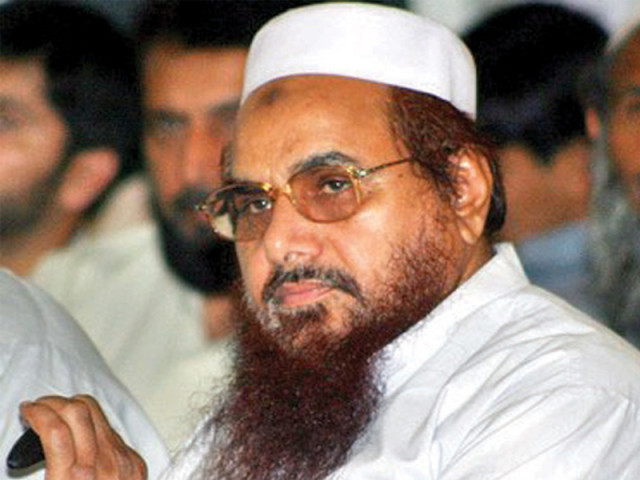Difa-e-Pakistan Council: Ahead of 40-party rally, JuD chief parries questions on electoral ambitions
New strategy includes writing each member of parliament on foreign policy.

These questions were partly answered on Tuesday by the chief of a leading member of the Difa-e-Pakistan Council. Hafiz Saeed of the Jamaatud Dawa (JuD) stressed, albeit vaguely, that the council was a coalition with the aim to “defend Pakistan”. “Political activity and ups and downs will continue regardless – but Pakistan has to be safe and secure,” he said.
Even though Saeed’s name has not been on a ballot, he claims it was a “misconception” that the JuD was not a political party, given that its activities – such as bringing together different parties and raising awareness on issues – are of a political nature. The JuD, which is allegedly linked with the banned militant organisation Lashkar-e-Taiba, serves as a pressure group and organises events on religious and political issues, including in favour of the blasphemy law. It also runs a philanthropic wing called the Falah-i-Insaniat Foundation.
“We believe the politics of polarisation harms the Ummah,” Saeed said, as he parried questions on whether the party would formally announce itself as a political party or participate in the elections.
Saeed was briefing journalists on Tuesday afternoon about the upcoming Difa-e-Pakistan Council event, to be held in Karachi on February 12. The council has already hosted events in Lahore, Multan and Rawalpindi.
While the JuD hosted the council’s event in Lahore, Saeed said the Jamaat-e-Islami (JI) had been entrusted with the responsibility in Karachi and would deal with acquiring permission for the venue and inviting other parties. So far, the venue has been decided as the ground opposite the Mazar-e-Quaid, a space that has gained considerable popularity in the last few months as it was the choice of the Pakistan Tehreek-i-Insaf (PTI), All Pakistan Muslim League and Jamiat Ulema-e-Islam (Fazl) for their rallies.
“The rally in Karachi will play a big role in [cementing] the objective of ensuring that no decisions [about Pakistan’s foreign policy] are made silently,” Saeed said.
The Difa-e-Pakistan Council has been in touch with mainstream political parties, and delegations have personally visited Pakistan Muslim League-N chief Nawaz Sharif and PTI chairperson Imran Khan. A delegation from the PTI attended the council’s event in Lahore, and according to Saeed, the JuD expects “good things” from Khan.
One of the council’s new strategies is to personally write to each member of parliament to ensure their concerns about Pakistan’s foreign policy are heard. JI chief Syed Munawar Hasan has announced that the party will stage a sit-in at parliament if its committee on national security’s recommendations includes reopening Nato supply lines. Saeed said the JuD and other parties would probably follow suit.
When asked whether outrage over foreign policy eclipsed a discussion on real issues people face, Saeed said, “I disagree with the assertion that these issues are separate. All the issues in Pakistan have come after the post-2001 agreements it made with the United States.”
Saeed did admit, however, that religious parties have been unsuccessful in amassing street power to oust governments. “Instead of just reacting to urgent issues, we should have constantly motivated people,” he conceded.
Saeed took this opportunity to clarify that Malik Ishaq, who is believed to be a key leader of the banned Lashkar-e-Jhangvi and was recently freed from detention, was not a ‘special guest’ at the council’s rally in Multan on Sunday. “Some sections of the media picked this up. He did not address the rally,” he said.
Hafiz Saeed said Pakistan had been possessed by a jinn - the US.
As far as the ‘jinn’ is concerned, Saeed concluded, “Some jinns leave [the body] with [the help of] prayers, and other [need to be forced out] with sticks”.
Published in The Express Tribune, February 1st, 2012.



















COMMENTS
Comments are moderated and generally will be posted if they are on-topic and not abusive.
For more information, please see our Comments FAQ